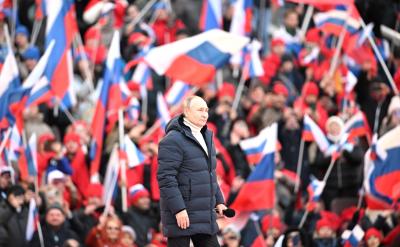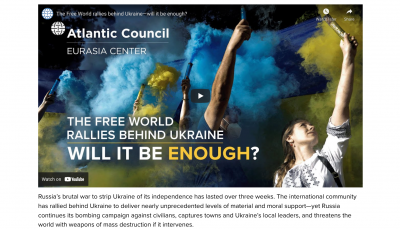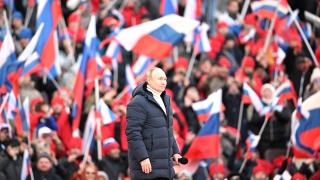by Harley Schlanger
March 18—In his virtual tour of the capitols of his allies this week, Ukraine’s President Volodymyr Zelenskyy made a startling admission. After years of campaigning for Ukraine’s admission to the NATO military alliance, he acknowledged that this will not happen. In spite of repeated promises by trans-Atlantic leaders that the “door to NATO membership is open,” he said he now realizes that “we can’t enter those doors. This is the truth, and we simply have to accept it as is.” As the pro-war London newspaper Telegraph noted, this concession by Zelenskyy “came close to meeting a demand issued by Putin,” who said giving NATO membership to Ukraine would be “crossing a Red Line.”
Zelenskyy also implied that he is now open to moving ahead to fulfill the Minsk II Agreement, on the status of the contested areas in the Donbas region of eastern Ukraine, which now are recognized by Russia as independent peoples’ republics. This implies acceptance of another of Russian President Vladimir Putin’s conditions for ending military operations. He added that the ongoing negotiations with Russia are going “pretty good.”

President Putin attended a concert marking eight years since Crimea’s reunification with the Russia, at the Luzhniki Sports Centre in Moscow. Photo Source: www.Kremlin.ru
Had he made such pronouncements four weeks ago, it is possible that Putin might not have launched special military operations in Ukraine.
Yet, at the same time he made these concessions, he pleaded with members of the parliaments in Ottawa, Brussels, London and Berlin, and members of Congress in Washington, to supply more weapons and military aid to Ukraine, and to enact a No-Fly Zone over his country, knowing that to do the latter would risk a war between Russia and NATO. While the official position of NATO leaders has been to reject this, some unhinged U.S. and British war hawks continue to push for more direct action against Russia, including support for a No-Fly Zone, and harsher sanctions. That Zelenskyy continues to pursue this, in spite of recognizing the futility of such a course, demonstrates that he is under enormous pressure from the U.S./NATO forces to continue fighting, justifying the charge that he is a puppet of western war hawks.
Such attitudes reflect a pathological hatred of Russia, which has been fed by psychological warfare run by U.S. and British intelligence agencies, which is reinforced by the non-stop promotion of the narrative in western media, which sustains a delusional belief in U.S./NATO military and economic power, and its ability to enforce a mythical “Rules-Based Order (RBO); and the equally delusional belief that ultimately, Russia, will be forced to submit to the RBO. It is driven by the fear that, as the western economies are spiraling downward in a systemic collapse, the economic alliance between Russia and China, cemented during the Putin-Xi Jinping summit on February 4—which represents a move toward full integration of the Eurasian Economic Union with China—represents an attractive alternative to many nations unwilling to submit to the Great Reset, in which they must sacrifice their sovereignty to western central banks.
This narrative ignores the reality of the actual nature of Russia’s military objectives, which military analyst Col. (USA ret.) Douglas Macgregor described as “largely complete.” Macgregor told the GrayZone on March 15, “The war, for all intents and purposes, has been decided. The entire operation from Day One was focused on the destruction of Ukrainian forces. That’s largely complete.” This is ignored, he added, because “in the West, there is no truth. There is wishful thinking and there is this impression of success by the Ukrainians that doesn’t stack up.” Thus, the Trans-Atlantic nations remain committed to a continued rearmament of Ukraine, as the west appears to be content to fight Russia to the last Ukrainian!
Economic Warfare vs. Russia
As Macgregor’s comments make clear, the promotion of these narratives is not about defending the “freedom” and “sovereignty” of Ukraine and its people. The refusal to negotiate seriously with Putin, to address his demand for security guarantees for Russia, has been dictated by the intention to destroy Russia, to finish the job initiated during the Yeltsin years, when Russia was plunged into a demographic collapse by the looting which resulted from the “shock therapy” economic warfare against it.
The goal of the sanctions regime, as stated explicitly by officials in an anonymous White House “background” briefing on January 25 to selected media, is to “devastate” the Russian economy, and to prevent any effort for modernization and diversification underway by Putin’s government. If successful, they believe, Putin would be discredited, and the door opened for a successful Color Revolution in Russia. They admitted the planning for the painful sanctions regime had been underway for months, confirming Putin’s comment that sanctions were coming, no matter what course he took in Ukraine.
President Joe Biden bragged about how “tough” he is on Putin and Russia in his State of the Union address, pointing to the sanctions he imposed. Before Russia began its military operations in Ukraine, Secretary of State Antony Blinken was on an extended tour, touting the pain that would be inflicted on Russia were its military to set foot in Ukraine. The same line was mouthed by U.K. Prime Minister Boris Johnson, EU Commission President Ursula von der Leyen, and NATO Secretary General Jens Stoltenberg.
But while various trans-Atlantic officials are arrogantly engaging in self-congratulations over the damage done by the economic warfare they have launched, one must not underestimate the significance of the British role in fomenting these destructive operations against both Russia and China—after all, the British have long engaged in economic warfare in defense of their empire, going back to the role of the neoliberal Malthusians of the British East India Company, and its actions which resulted in the deaths of between one and two million Irish in the Potato Famine between 1845 and 1852, and the waves of famines which swept India in the 18th through the 20th century, with deaths in the tens of millions.

Memorial in Dublin, Ireland, showing emigrants leaving Ireland to escape the Famine (1845-1849) which had been created by the policies of the British East India Company.
The tools employed today may be different, but the intent is the same, to contain the potential threat posed by sovereign nation states to the deadly looting operations run by the financial oligarchy in the City of London. And while Britain today lacks the power to unilaterally run the post-Cold War order, the United States serves as the leading military enforcer of the new empire, operating under the direction of trans-Atlantic banking, insurance, and other interlocking corporate cartels.
The Brits in the Lead
The ugly face of this new Malthusian policy is Foreign Secretary Liz Truss, who has emerged as the enforcer of the new imperial policy directed by the City of London, “Global Britain.” Truss laid out the next phase of economic warfare in a March 10 address at the Atlantic Council, an Anglo-American think tank funded by the U.S. and British governments, NATO, and the corporate cartels of the Military-Industrial Complex.

War is good for business for the Atlantic Council's corporate sponsors. Source: AtlanticCouncil.org
The Atlantic Council has a special division in charge of drafting increasingly harsh sanctions, headed by Daniel Fried, the former director of sanctions at the U.S. State Department under President Obama. Fried ran the initial sanctions policy against Russia, after the Kremlin reacted against the U.S.-directed Color Revolution coup in Kiev in February 2014. Truss outlined, in her address to the Atlantic Council, the British intent to use the current war against Russia as the crucible for crafting a new imperial global security architecture and economic structure, which runs counter to the principles in the United Nations Charter, and is diametrically opposed to the idea of the common humanity of all peoples represented by the call of the Schiller Institute to convene a conference to adopt a new security and financial architecture.
The crisis in Ukraine, she said, is—
a paradigm shift on the scale of 9/11, and how we respond today will set the pattern for this new era. If we let Putin’s expansionism go unchallenged, it would send a dangerous message to would-be aggressors and authoritarians around the world, and we simply can’t allow that to happen. We have to start with the principle that the only thing aggressors understand is strength. [But we] are still not doing enough, [she said, describing the next steps to destroy Russia:] We want a situation where they can’t access their funds, they can’t clear their payments, their trade can’t flow, their ships can’t dock, and their planes can’t land.... And we must do more to deliver defensive weapons…. We will do all of this, and we will shape this new global era for global security.
In presenting her case, Truss was presenting the talking points drafted by the Atlantic Council’s sanctions guru, Daniel Fried, who co-authored a piece posted by the think tank the day before her speech, “What’s Left to Sanction in Russia? Wallets, Stocks, and Foreign Investments.” Fried and coauthor Brian O’Toole, a former adviser to the Office of Foreign Assets Control at the U.S. Department of Treasury, write that the impact of sanctions imposed so far has been to “flatten Russia” such that “‘Fortress Russia’ is no more.” By isolating Russia, the sanctions “spell disaster for the Russian people.” But since Putin is continuing to attack, “the West needs to keep developing escalatory options” until Russia withdraws from Ukraine and provides assistance to rebuild the country.
Fried and O’Toole conclude that removing or suspending sanctions after the war’s end would be “complex,” since Putin’s promises “simply can’t be trusted.” This strongly implies that their intent is to maintain a permanent sanctions regime.
The demand for more extreme measures against Russia was continued by the CEO of the Atlantic Council, Frederick Kempe, in an article posted on March 13 titled “The Western response to Putin has been remarkable. But it’s not enough.” After stating that the deliveries of weapons to Ukraine are “impressive,” the economic and financial sanctions are “unprecedented” and “historic,” and that the “transatlantic and international support was unanticipated ... this is not enough.” More must be done, “and quickly ... more sanctions, more military support, and more international unity.”
Citing former U.S. Defense Secretary Robert Gates’ statement on the “Russian and Chinese challenge ... to the peaceful order,” he calls Putin’s military operations in Ukraine “an epochal challenge.” After giving his endorsement to Fried and O’Toole’s proposals, he concludes by asserting, “Putin has lost,” but his opponents have not yet won. “What has been accomplished against Putin thus far is remarkable, but it is still insufficient.”
British Intelligence’s Ultimate End-Game
A more extreme program for the economic destruction of Russia was published by Chatham House, an arm of British intelligence, on March 17, under the headline “A Negotiated Peace with Russia Is Fraught with Danger.” It was written by James Nixey, who is the Director of Chatham House’s Russia-Eurasia Program. He opens by chiding the European Union for its “ugly recent history of successfully pressuring independent states into making concessions to Russia by ‘accepting the inevitable.’” He cites the Minsk II Accord as an example of this, writing, “Ukraine was forced to sign a second Minsk Agreement on terms favorable to Russia,” which, if implemented, “would effectively mean the end of” Ukraine.
After accusing Putin of threatening to use nuclear weapons as a “standard part of his repertoire,” as a “successful diplomatic tactic,” he asserts that Russia has no interest in de-escalation. Only “wide-ranging countermeasures can have any effect ... not ordinary sanctions, but massive sanctions, ‘oligarch squeezing,’ disinvestment especially in energy, cultural and sporting boycotts, supporting Ukrainian resistance with military, economic and humanitarian assistance, and assurances of international criminal legal recourse....”
The idea behind support for military aid for “Ukrainian resistance” was laid out in a March 5 Washington Post article, “U.S. and allies quietly prepare for a Ukrainian government-in-exile and a long insurgency,” which includes backing for guerrilla warfare operations against “Russian occupiers.” That such a plan is being considered proves conclusively that the ultimate goal is not support for “democracy” in Ukraine, nor love of the Ukrainian people. This would be a repeat of the ultimately disastrous consequences of U.S. support for opposition to the Soviet-backed regime in Afghanistan, which gave weapons to the Taliban and Al Qaeda; and a similar result from providing weapons and training to “moderate rebels” in Syria, which ended up in the arms of ISIS and Al Qaeda/Al Nusra terrorists, with devastating results for the people of Syria.
The future intended by the empire, evident in the language of those calling for regime change in Russia and China, is the division of the world into competing blocs engaged in permanent warfare, operating within a global central bankers’ Malthusian dictatorship known as the “Great Reset.” Those who reject this dystopian vision can join with the Schiller Institute, to organize for a new paradigm, based on establishing a security and financial architecture fostering the mutual benefit of all sovereign nations and people.
HarleySch@gmail.com






